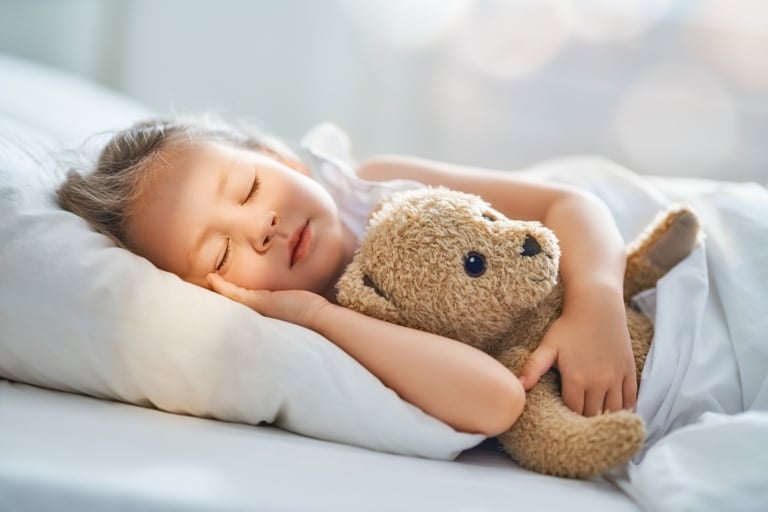
As a holistic pediatrician, one of the most common questions I’m asked during an office visit is “How do I help my child sleep better?”
I’m not sure now is the time to delve into the complexities of sleep patterns, but I assure you, sleep is complex and key to good health. Sleep patterns and requirements are also made more challenging to understand in children because they change based on age. Newborn sleep habits are certainly different compared to a baby who is 6 months and older.
The interesting thing is that I don’t think many of us appreciate sleep until it’s gone. While pregnant, many women (I was one of them) start to wake up more frequently at night. I once heard this was because our bodies were slowly conditioning to becoming sleep deprived. I’m smiling as I write this, because I see the truth in that. And of course, after baby arrives, there’s nothing better than the first 3-4 hours stretch of uninterrupted sleep.
Sleep Issues Can Persist
In any case, we all know about the lack of sleep in early babyhood. However, what I’ve found is that these issues with sleep can extend past the baby and even toddler stage. Hence the reason this is a topic of concern for most parents.
And yes, I find sleep issues often related to one of the following: chronic sinusitis, chronic ear infections, eczema, food allergies, asthma, constipation, inattention, hyperactivity, anxiety. Though, to address the root cause of all these issues is complex and differs from child to child. I'll be sure to provide more information on those conditions in future articles.
Therefore, the following are some gentle, everyday recommendations to enhance quality of sleep for your children. Keep in mind these are best paired with a focus on good nutrition and avoidance of caffeine.
Enhance Quality of Sleep with Good Sleep Habits
Prioritize sleep. I think we can apply this to grown-ups as well. And, as is true for all lifestyle modifications for children, emphasizing the importance of sleep is best done when incorporated by the entire family.
Ensure a calm environment. It may be helpful to have the time after dinner as designated quiet time in the house. Low lights (this is my favorite), calm music, and no screens.
Avoid screens of all kinds 2 hours before bedtime. This is easier said than done, but it’s a good goal to set. Artificial lights after dusk may reduce sleep quality by suppressing release of the hormone melatonin by the brain’s pineal gland.
Warm, Epsom Salt baths. This is a very gentle way of increasing absorption of magnesium by the body, which can enhance sleep and relaxation. I like to use 1 cup of Epsom Salts in bath full of warm water. For children, I avoid the use of essential oils to the bath water because some have endocrine disrupting potential. Therefore, just plain Epsom salts is my recommendation.
Essential Oil Diffuser. Although I’m not a big fan of using essential oils directly in the bath for young children, I love them through a diffuser. Particularly, lavender can be very calming.Enhance Mind-Body Connection. I’m a firm believer that everything is interconnected (our minds and body). Yes, it’s important to let our children experience disappointment, sadness, and frustration during the day. But they should also have the ability to end the day on a positive note. Some techniques to help them (and us) do this is through yoga and meditation. Here’s a link to a site I’ve found helpful on yogajournal.com. Pair these poses with gentle, meditation music and it’s quite relaxing to do as a family. And for meditation, there are a variety of guided audio meditations for families to do together. My favorite app is HeadSpace, though many families I meet like another app, called Calm.
Chamomile Tea. Chamomile is an amazing herb, known for its ability to calm and help with anxiety. Chamomile has a very pleasant taste, so most children like it. Though I recommend being cautious with chamomile if your child is allergic to ragweed. As a side note, one of my new favorite apps is called HerbList, which is an app sponsored by the National Center for Complementary and Integrative Health, which is a part of the National Institutes of Health (NIH).
References:
The Holistic Pediatrician: A Pediatrician’s Comprehensive Guide to Safe and Effective Therapies for the 25 Most Common Ailments of Infants, Children and Adolescents. Kemper, Kathi. August 2002.
Aviva Romm: https://avivaromm.com/sleep-well-7-natural-tips-for-getting-great-zzzzz/
Children and Sleep. https://www.sleepfoundation.org/articles/children-and-sleep
.png?width=305&height=132&name=NIHAlogoBLUE_3_transparent%20(2).png)
